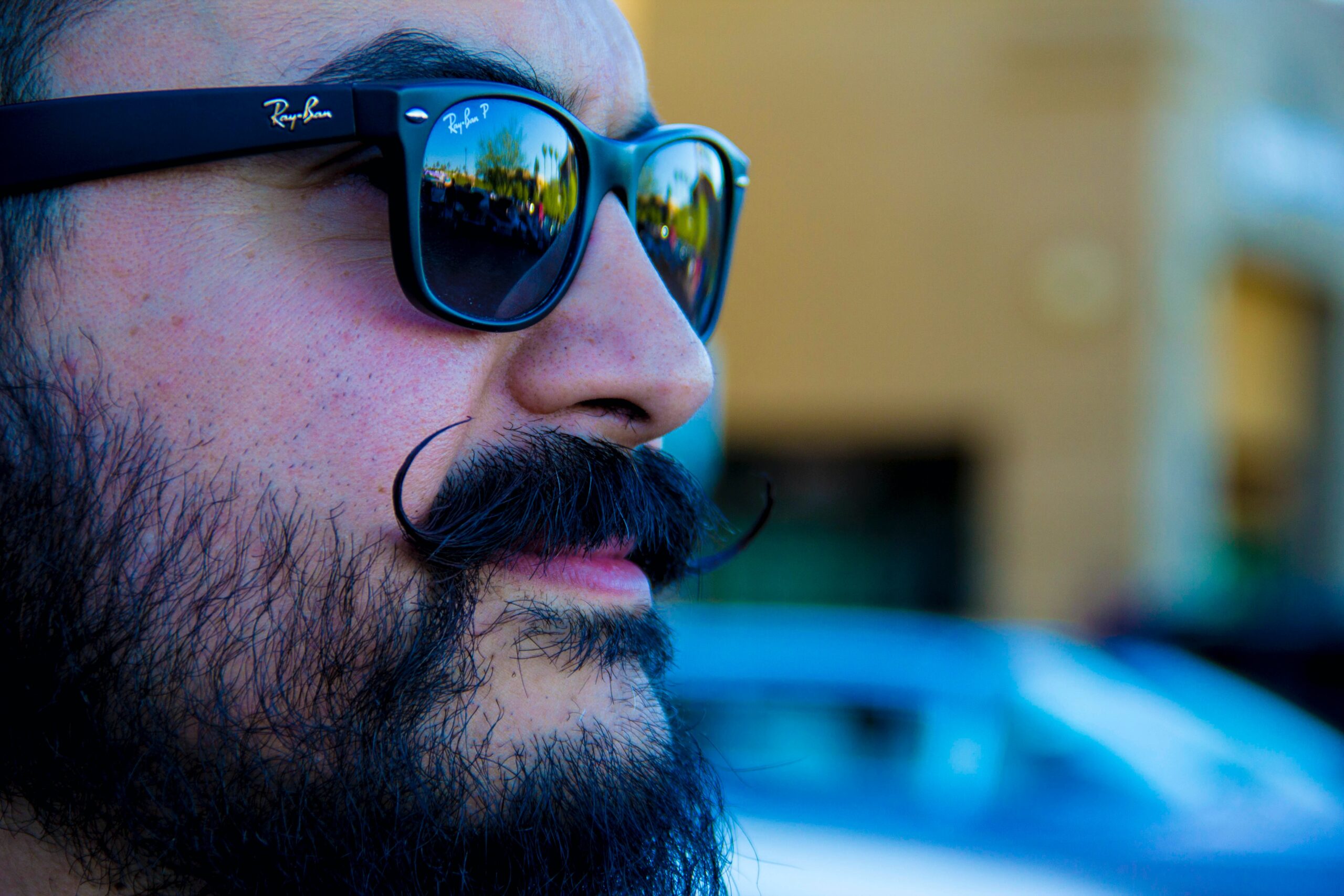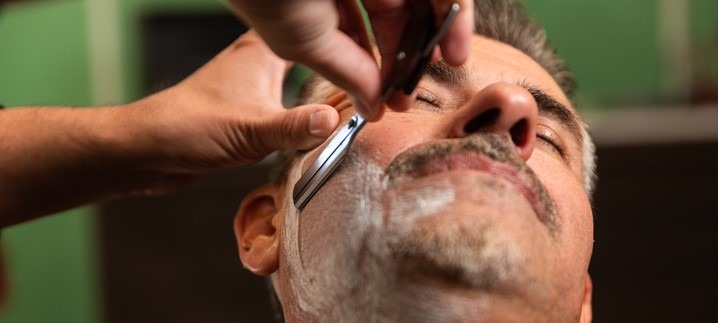Is It Spelled Mustache or Moustache?
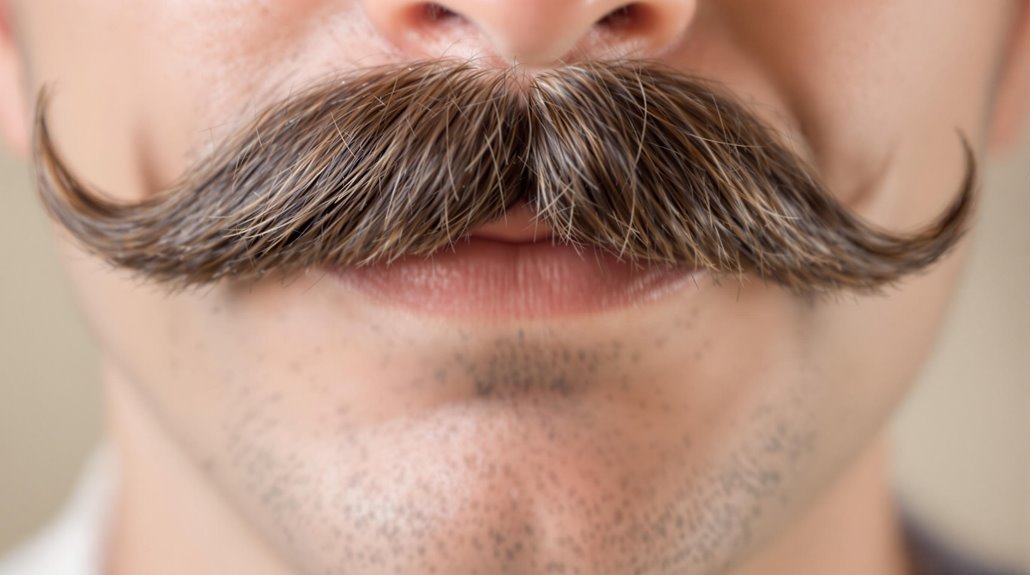
You've probably noticed that "mustache" is common in American English, while "moustache" pops up in British English. This difference stems from each region adopting the term from French at different times. In the U.S., "mustache" became more common around the 1940s. Despite this, you'll still see "moustache" in some American texts due to linguistic flexibility. Regardless of whether you're saying "muh-stash" or "muh-staach," both spellings reflect the word's rich history and cultural significance. Understanding these variations can help in international communication or even enhance your SEO if you're optimizing content for different audiences. Want to uncover more layers?
Spelling Variations by Region
While exploring the spelling variations of the word for the hair above the upper lip, you'll notice regional differences between "mustache" and "moustache." In American English, "mustache" is the go-to spelling, whereas British English favors "moustache." These variations are rooted in the historical adoption of the word from French, with the British retaining the original spelling's extra letters. The choice between "mustache" and "moustache" becomes more than just a spelling preference; it's a reflection of regional linguistic identity.
In the United States, "mustache" has dominated since the 1940s, making it the standard in everyday writing. However, don't be surprised if you occasionally spot "moustache" in American texts, as some individuals prefer the British spelling. This cross-pollination of spellings underscores the fluid nature of language.
In British English, "moustache" remains steadfast, showcasing its older roots with the additional vowels intact. For anyone writing in an international context, it's essential to choose one spelling and stick with it throughout your text. Consistency guarantees clarity, helping you communicate effectively with your audience, regardless of their familiarity with American or British conventions.
Historical Origins of the Word
In tracing the historical origins of the word "mustache," you'll find its roots embedded in the Italian word "mostaccio," which directly refers to the hair above the upper lip. This term didn't evolve in isolation; it received influences from similar words in other languages like Spanish and French. The French version, "moustache," became a direct reference to the same facial hair. It's fascinating how the word traversed different cultures and languages before settling into English usage.
The initial recorded use of "mustache" in English dates back to the mid-1500s. Early texts reveal a variety of spellings, including "muchatoes" and "mustachios," showcasing historical variations in how people adapted the term over time. These variations illustrate the fluid nature of language and how words evolve to fit different phonetic and cultural contexts.
In modern times, the preference for "mustache" in American English and "moustache" in British English highlights regional differences. These differences are deeply rooted in the word's etymology and illustrate how language can separate based on cultural influences. So, regardless of whether you choose "mustache" or "moustache," you're tapping into a rich tapestry of linguistic history.
Cultural Context and Significance
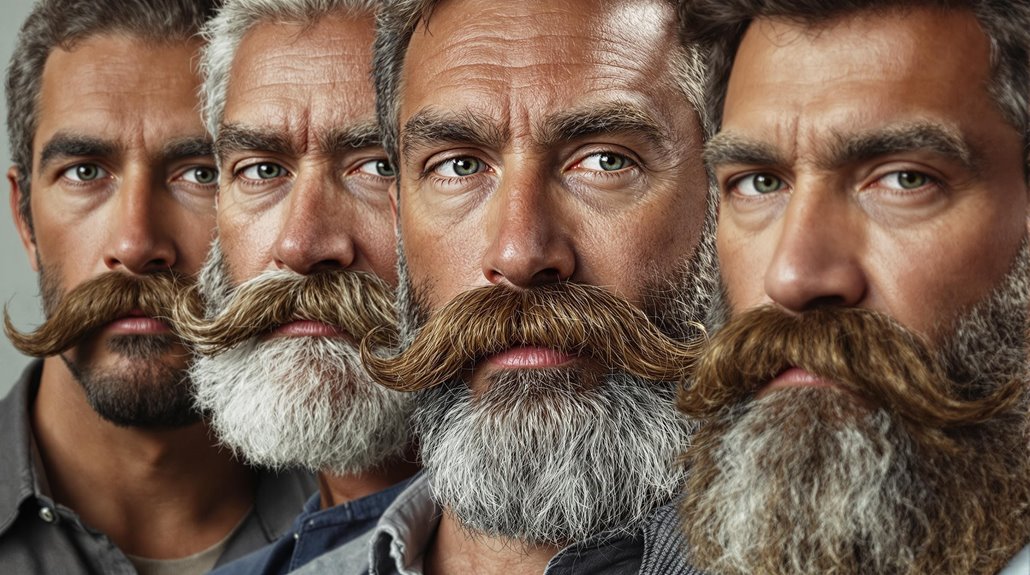
Beyond its historical origins, the mustache, or moustache, holds a significant place in cultural and regional identities around the world. Distinct styles of mustaches often reflect local grooming practices and fashion trends, making them more than just facial hair. In British culture, the moustache has historical significance, especially in sports like cricket, where it's celebrated as part of the traditional attire. This highlights the moustache's role in conveying cultural values and heritage.
In Australia, the term "Movember" cleverly combines "moustache" and "November" to raise awareness for men's health issues, particularly prostate cancer. This initiative demonstrates how the moustache can be a powerful symbol for social causes, extending its cultural significance beyond mere aesthetics.
Across different cultures, mustaches have been viewed as enduring symbols of masculinity and personal expression. They influence perceptions of male prestige and status, making them integral to the narrative of manhood in diverse societies. Literary and cultural references further cement the moustache's role in society, shaping how it's perceived across distinct regions. Ultimately, regardless of spelled "mustache" or "moustache," this iconic facial feature remains a powerful emblem of identity and cultural significance.
Mustache Trends in the US
You'll notice that mustache trends in the US have seen a fascinating evolution, particularly gaining traction during the 1970s. This period, marked by influential pop culture icons, saw the mustache become a symbol of the rising masculinity in American fashion. Today, the mustache remains a staple in facial hair trends, with about 25% of American men including it in their grooming routine.
The popularity of mustache grooming products like waxes and oils reflects a growing trend towards careful facial hair care. These products help maintain a well-styled and healthy mustache, catering to the modern American man's grooming needs.
Furthermore, mustache competitions across diverse American cities celebrate creativity and individuality, drawing enthusiasts keen to showcase unique styles. These events highlight the mustache as more than just facial hair—it's a form of self-expression.
The Movember initiative has also played a significant role in mustache trends, encouraging men to grow mustaches in November to raise awareness for men's health issues, such as prostate cancer.
Here are some key highlights of the mustache trend in the US:
- Pop culture influence in the 1970s
- Rise of mustache grooming products
- Mustache competitions across the US
- Movember initiative for men's health
- 25% of American men sporting mustaches
Moustache Traditions Abroad
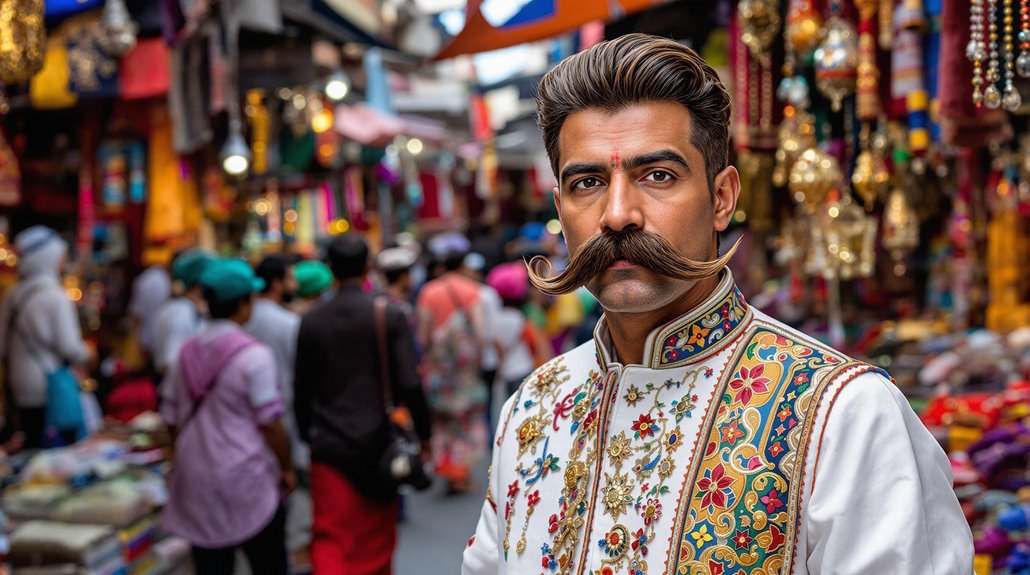
Have you ever noticed how moustache traditions vary around the world? In the UK, the moustache is more than just facial hair—it's intertwined with British culture and history. One of the most notable associations is with cricket, where a moustache symbolizes masculinity and sportsmanship. Despite its iconic status, over 50% of British men face challenges in cultivating one, highlighting regional grooming issues.
Across the British Empire, particularly in colonial India, the moustache held a different kind of power. It was a mark of male prestige and social status, influencing how men approached grooming. This cultural exchange left a lasting impact, with the moustache being a prominent symbol of authority and honor.
Notable British figures have also contributed to the moustache's storied history. Sir Winston Churchill, with his distinctive moustache, reinforced its association with leadership and authority. This has seeped into British media and literature, where the moustache often represents traits like wisdom or villainy.
Understanding these diverse traditions helps you appreciate the moustache's significance beyond mere fashion, offering insights into British grooming practices and cultural history. It's fascinating to see how such a small feature can hold so much meaning globally.
Mustachio in Literature
Literature often employs the term "mustachio" to bring characters to life with a playful or theatrical flair. This term goes beyond a simple descriptor—it's a tool that authors like Charles Dickens and George Eliot have used to enrich their character descriptions. By emphasizing ornate or exaggerated facial hair, "mustachio" adds layers of cultural significance and personality to the narrative.
In literature, mustachios are more than just facial hair; they symbolize a range of traits and societal identities. They're often used in humorous contexts, highlighting their fanciful nature and the comedic potential of exaggerated styles. Regardless of being in poetry or prose, "mustachio" conjures images of flamboyant mustaches, evoking masculinity or eccentricity, and allowing readers to visualize the characters vividly.
- Charles Dickens: Known for colorful character descriptions using mustachios.
- George Eliot: Integrated mustachios to reflect societal norms of her time.
- Symbolism: Mustachios often signify masculinity or eccentricity.
- Humor: Used in comedic literature for a playful twist.
- Cultural Evolution: Highlights changing perceptions of facial hair in social identity.
Thus, "mustachio" in literature is more than a word—it's a bridge to understanding character and culture.
Contemporary Usage Patterns
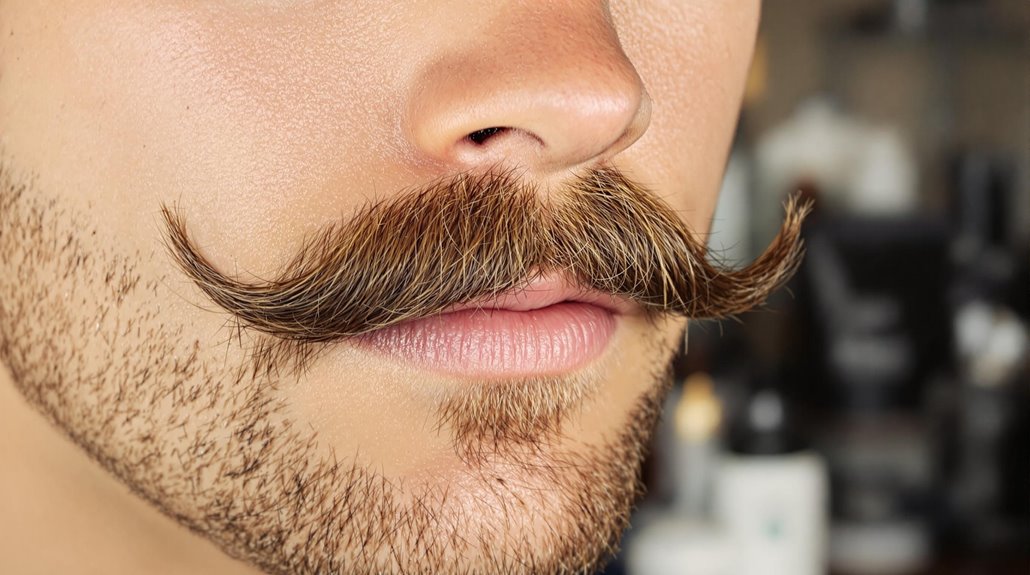
In the current world, the spelling of "mustache" versus "moustache" can tell you a lot about cultural and linguistic preferences. If you're in the United States, you'll notice that "mustache" is the go-to spelling in American English. Head over to the UK or other regions, and "moustache" is preferred, aligning with British English norms. This distinction isn't just a spelling quirk; it reflects broader cultural contexts and identity.
In contemporary usage, the term "mustachioed" pops up frequently, especially when emphasizing the grooming or size of a mustache in modern conversations. This can be seen during cultural discussions or competitions that celebrate facial hair. Curiously, recent surveys suggest that over 50% of men in the UK face challenges growing a moustache, which can influence trends and preferences in grooming.
Movember, a global movement, cleverly combines "moustache" and "November" to raise awareness for prostate cancer. It has gained tremendous popularity, showcasing how spelling can carry cultural significance. Historical literature continues to support these tendencies, with "mustache" dominating American contexts and "moustache" leading in British ones, underscoring the evolution of language and style.
Language and Orthographic Differences
Through the lens of language and orthographic differences, the spelling of "mustache" versus "moustache" illustrates how regional dialects influence written expression. In English, these differences reflect a broader pattern of linguistic divergence between American and British variants. You might notice that "mustache" is the go-to spelling in American English, whereas "moustache" holds its ground in British English and other regions. This distinction isn't arbitrary; it stems from their French etymology, where "moustache" originates.
American English often omits the 'u', simplifying words, which is why "mustache" differs from its French counterpart. Meanwhile, British English retains this letter, preserving the original form. Pronunciation can also vary, with "mustache" usually pronounced as "muh-stash" in America and "moustache" as "muh-staach" in Britain. Despite these spelling and pronunciation differences, both terms are correct within their respective dialects.
When considering these differences, remember:
- "Mustache" aligns with American English.
- "Moustache" retains French influence in British English.
- Pronunciation varies by region.
- Both spellings are etymologically linked.
- Regional preferences shape language use.
SEO and Content Marketing Tips

Grasping the regional spelling differences between "mustache" and "moustache" is crucial for crafting effective content marketing and SEO strategies. Understanding that "mustache" is the common spelling in American English while "moustache" is preferred in British English can greatly improve your approach. When creating SEO content, using the correct spelling for your target audience can elevate your search engine rankings. Since algorithms might treat "mustache" and "moustache" differently, using the appropriate term can enhance visibility in specific English-speaking regions.
To broaden your reach, consider incorporating both spellings in your content. This approach caters to diverse audiences, increasing your chances of attracting traffic from both American and British users. Furthermore, researching keyword trends for both versions of the word can inform your content creation, ensuring it connects with users searching for either term. Implementing local SEO strategies that account for spelling variations can demonstrate your brand's authority and trustworthiness in specific markets. By showcasing an understanding of regional language preferences, you can engage more effectively with your audience and improve your brand's presence across different locales.



